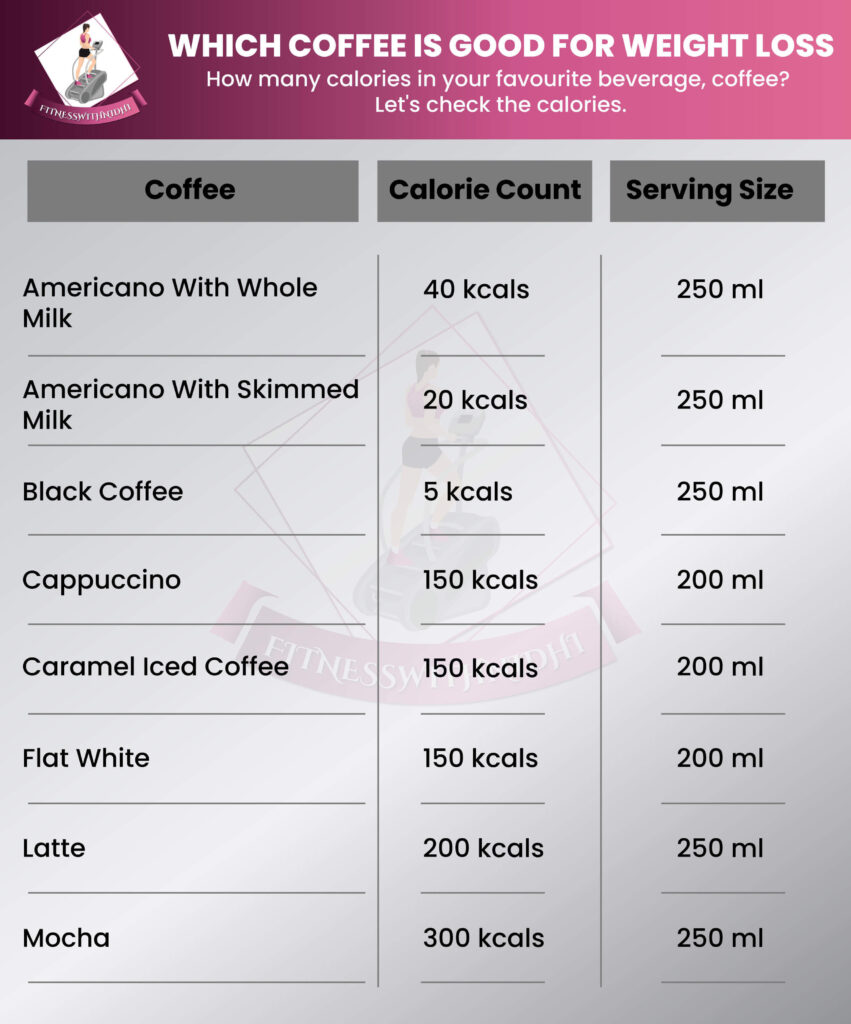For all those who follow me on Instagram; know how much I love the beverage. In the quest for achieving weight loss goals, we often turn to various methods and strategies. One popular beverage that has gained attention in this context is black coffee. Known for its strong flavour and minimal calories, black coffee has been associated with potential weight loss benefits.
The Science Behind Black Coffee and Weight Loss
Black coffee is essentially coffee brewed without any additives such as milk, sugar, or cream. It is naturally low in calories and contains several bioactive compounds, including caffeine, chlorogenic acids, and antioxidants. These components are believed to contribute to its potential impact on weight loss.
9 Types of Coffee

When to consume black coffee for weight loss?
The timing of black coffee consumption can play a role in its potential impact on weight loss. Here are some considerations regarding when to consume black coffee for weight management:
- Before a Workout: Consuming black coffee 15- 20 minutes before a workout can be beneficial. The caffeine in coffee can enhance focus, alertness, and physical performance, which may help you engage in more intense and productive exercise sessions. Additionally, black coffee can boost metabolism and increase fat oxidation, potentially optimizing the calorie-burning effects of your workout.
- Between Meals: Drinking black coffee between meals can act as an appetite suppressant and help control cravings. The caffeine content can help reduce feelings of hunger and keep you feeling fuller for longer, which may prevent overeating and support weight management. Coffee contains anti–nutrients so should be avoided with meals.
- In the Morning: Having black coffee in the morning can provide an energy boost to kickstart your day. It can increase alertness and mental focus, helping you stay active and potentially burn more calories throughout the day.
- Avoid Late Afternoon or Evening: It is generally advisable to avoid consuming black coffee late in the afternoon or evening. The caffeine content can interfere with sleep quality and duration, which is crucial for weight management. Poor sleep has been associated with weight gain and disrupted metabolism. If you are sensitive to caffeine or have trouble sleeping, it is best to limit your black coffee consumption to earlier in the day.
7 Black Coffee Benefits for Weight Loss
Black coffee has been suggested to have several properties that can aid in weight loss. It’s important to remember that consuming black coffee alone won’t miraculously reduce weight; it should be combined with a balanced diet and regular physical activity for effective results. Here are some ways black coffee may support weight loss:
- Boosts Metabolism: Caffeine, a natural stimulant found in coffee, can boost your metabolic rate. A higher metabolism means your body is more efficient at burning calories.
- Enhances Physical Performance: Caffeine increases adrenaline levels in the blood, the fight or flight hormone which prepares your body for physical exertion. This can enhance physical performance and help you to burn more calories during workouts.
- Appetite Suppression: Some studies have shown that caffeine can reduce feelings of hunger, which might help you eat less and create a calorie deficit.
- Increases Fat Burning: Caffeine can increase the release of fat from fat tissue and increase the burning of fat for fuel. This process, known as lipolysis, can contribute to weight loss.
- Improves Mental Focus and Alertness: Coffee can improve mental focus and alertness which can be helpful in maintaining motivation and dedication to a workout routine and diet plan.
- Antioxidant Properties: Black coffee is rich in antioxidants which can help to combat the oxidative stress and inflammation that are associated with obesity.
- Lowers Risk of Type 2 Diabetes: Some studies have shown that regular coffee consumption is associated with a reduced risk of developing Type 2 Diabetes, a condition which is often associated with obesity.
Always remember to consult a healthcare professional before making significant changes to your diet, especially if you have any underlying health conditions.

4 Potential Side Effects of Black Coffee
While black coffee may offer weight loss benefits, it is essential to consider certain limitations and factors that may affect its effectiveness:
- Caloric Intake: While black coffee itself is low in calories, the additions we make, such as sugar or cream, can significantly increase its caloric content. Be mindful of your overall calorie intake, especially if you tend to add these extras to your coffee.
- Adverse Effects: Excessive consumption of black coffee, particularly due to its caffeine content, can lead to side effects such as insomnia, anxiety, increased heart rate, and digestive issues. It is important to moderate your intake and be aware of your caffeine sensitivity.
- Stay Hydrated: Remember to balance your black coffee consumption with adequate hydration. Coffee has a diuretic effect and can contribute to fluid loss, so it’s important to drink water alongside or after consuming black coffee to prevent dehydration.
- Diuretic Effect: Black coffee has a diuretic effect, meaning it can increase urine production and reduce water retention. While this effect may lead to temporary weight loss due to fluid loss, it is essential to stay hydrated and not rely solely on this mechanism for long-term weight management.
Relying solely on black coffee as a weight loss strategy may not yield optimal results. It is crucial to adopt a holistic approach that includes a balanced diet, regular exercise, proper hydration, and adequate sleep for overall weight management. Contact us for a customized meal plan for weight loss.
How to make black coffee for weight loss
Making black coffee for weight loss is a simple process that involves brewing coffee without any additives like sugar, milk, or cream. Here’s a step-by-step guide on how to make black coffee for weight loss:
- Choose the Right Coffee: Opt for high-quality, freshly ground coffee beans. The flavour and aroma of freshly ground coffee can enhance your black coffee experience.
- Measure the Coffee and Water: Use a coffee scoop or tablespoon to measure your coffee grounds. As a general guideline, use approximately 1 to 2 tablespoons of coffee per 6 ounces (180 milliliters) of water. Adjust the measurements according to your taste preferences.
- Boil Water: Heat filtered water in a kettle or on the stovetop until it reaches a boiling point.
- Brew the Coffee: Place the desired amount of coffee grounds into a coffee filter. Slowly pour the hot water over the coffee grounds, allowing the water to extract the flavors.
- Remove the Coffee Grounds: Once the coffee has finished brewing, remove the coffee filter.
- Serve and Enjoy: Pour the freshly brewed black coffee into your preheated mug. You can drink it as is or let it cool slightly before consuming it. Avoid adding any sugar, milk, or cream to maintain its low-calorie content.
6 Signs you are drinking too much coffee
- You can’t sleep: Coffee contains caffeine, a stimulant that can increase alertness and reduce drowsiness. The effects of caffeine can vary from person to person, but generally, it takes several hours for caffeine to wear off the body.
- You get headaches: Consuming excessive amounts of coffee can lead to headaches. Caffeine, the primary stimulant in coffee, has both stimulating and vasoconstrictive effects on the body. It can cause blood vessels in the brain to narrow, which can result in headaches for some individuals.
- You feel anxious: Caffeine is a stimulant that can activate the central nervous system and increase alertness. It can also stimulate the release of stress hormones like cortisol and adrenaline, which can contribute to feelings of anxiety or restlessness
- Your stomach hurts: Coffee contains various compounds, including acids, that can stimulate the production of stomach acid. This increased acid production can irritate the lining of the stomach and cause symptoms such as stomach pain, heartburn or indigestion.
- Your heart is racing: Consuming excessive amounts of coffee can lead to an increased heart rate or palpitations in the same individuals. Caffeine is a stimulant that can stimulate the central nervous system, including the cardiovascular system. It can cause the release the adrenaline, which can result in a faster heart rate and increased blood pressure
- You have diarrhoea: Coffee has been found to have laxative effects in some people due to its impact on gut mobility, causing diarrhoea.
4 Tips from Fitness with Nidhi to Enhance the Flavour and Variety
- Experiment with Different Coffee Beans: Explore various types of coffee beans, such as Arabica or Robusta, and different roasts to find the flavour profile that suits your taste buds.
- Add Spices: To enhance the flavour without adding calories, consider adding spices like cinnamon, nutmeg, or cardamom to your black coffee. These spices can provide a unique twist and may have additional health benefits.
- Try Cold Brew: If you prefer a cold beverage, you can make cold brew coffee by steeping coffee grounds in cold water overnight in the refrigerator. This method produces a smoother and less acidic coffee.
- Stay Hydrated: While coffee can contribute to your daily fluid intake, it’s important to remember that it has a diuretic effect. Make sure to drink plenty of water throughout the day to stay hydrated.
Which coffee is good for weight loss?
How many calories are in your favourite beverage, coffee? Let’s check the calories.

Conclusion
While black coffee may have certain potential benefits for weight loss, it is not a magic potion that guarantees significant results on its own. It can serve as a supportive element within a comprehensive weight management plan, aiding in boosting metabolism, suppressing appetite, and enhancing energy levels.
Remember, sustainable weight loss is achieved through a combination of healthy eating habits, regular physical activity, and a well-rounded lifestyle. Always consult with a healthcare professional or a registered dietitian before making significant changes to your diet or starting a new weight loss regimen.




